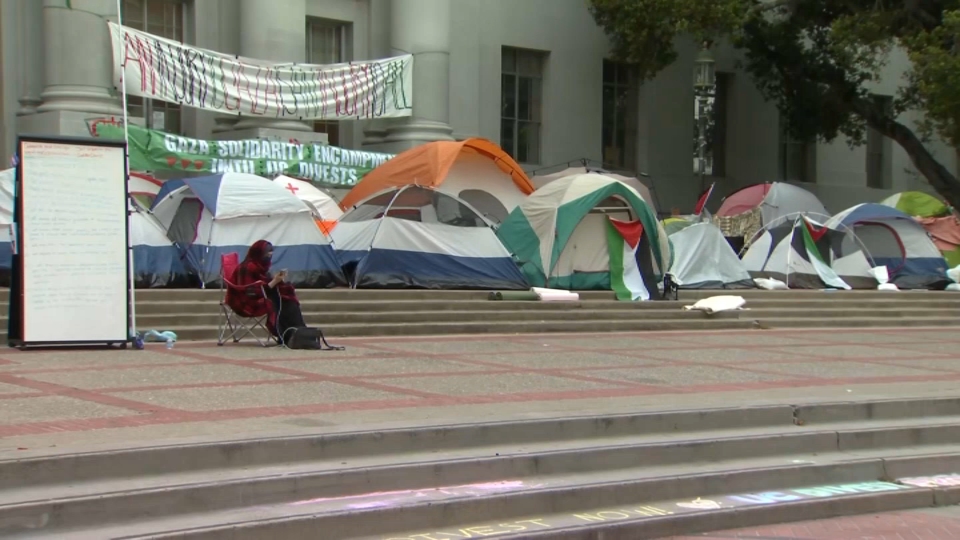A persistent leaking problem is the most significant risk Muni must overcome this month to meet the scheduled fall opening date of the long delayed $1.9 billion Muni Central Subway, according to the federal monitor overseeing the troubled project.
NBC Bay Area has obtained Muni photos showing leaks in the three underground stations on the project: Yerba Buena, Union Square and Chinatown. At the Yerba Buena station, photos show standing water and evidence of leaks in electrical rooms as well as the ceiling of the concourse level. In Union Square, telltale white residue is evident in photos taken of the platform walls as well as the concourse walls and ceiling. The Chinatown station photos show signs of leaks in the tunnel ceiling and the platform.
Muni says the standing water is no longer a problem at Yerba Buena, although some leaks remain in its electrical rooms there. The Union Square leaks have been plugged, it says, and crews should soon finish sealing up all the Chinatown leaks.
Five-decade veteran engineer Jerry Cauthen was skeptical after he reviewed the Muni photos we provided that showed apparently extensive water intrusion in the subway system. “Wow, that’s a lot of leaks -- many, many leaks,” he said. “Definitely more than I’ve seen before.”
Get a weekly recap of the latest San Francisco Bay Area housing news. Sign up for NBC Bay Area’s Housing Deconstructed newsletter.
Cauthen has worked on several underground transit projects in the city, including Muni Metro and BART. He says the Central Subway was always going to be tricky, because the main tunnel is some 100 feet deep. It’s also built in the path of what Muni official say was a previously unknown underground river.
“When it gets down low, the water has tremendous pressure,” Cauthen said, “against any surface. When you are down 100 feet, it’s 6,240 pounds per square foot -- a huge amount of pressure.”
The key to preventing leaks in that environment, he says, is to have a properly sealed, resilient membrane that’s protected against damage when concrete is installed. “If it isn’t sealed from the outside, very thoroughly, that water is going to work its way through and it’s going to show up in the inside,” Cauthen said.
Local
NBC Bay Area first reported on the Central Subway leak problem in 2019, when the project was already a year behind schedule. Muni assured us then it had the problem in hand, but three years later, the agency acknowledges to city officials that it has had “mixed results” with its multiple efforts to plug the leaks, despite sinking between $500,000 and $800,000 into fixing the problem, according to the federal monitor on the project.
The contractor blames a design flaw, and the monitor says an outside consultant recently agreed with that conclusion. According to the monitor, the consultant found in December the concrete system is not properly sealed tight against leaks, like a bathtub. In its most recent report, the monitor warns the leak issue must be dealt with this month to have any chance of meeting the fall scheduled opening date. It put leaks atop its list of risks that could trigger postponement, along with Covid-19 related delays.
In a statement, Muni said the problem is not unusual for underground projects and it’s made progress in solving it with grouting. Muni is now relying on an Australian pressure grouting technology that permeates concrete to form a barrier against water intrusion.
But Cauthen – a longtime critic of the project -- wonders how all those leaks can be truly sealed in such a short time, especially given the troubled track record of the project.
“Nothing about this has been done very well,” he said, adding that he couldn’t believe it when he saw the photo showing standing water in a Yerba Buena station electrical room controlling the traction system for the railway.
“That’s not where you want water standing, that’s for sure,” he said. “You don’t want someone getting electrocuted.”
Muni officials say they’ve plugged the leaks that had created any standing water and they will deal with remaining residual minor leaks in time to safely open as planned this fall.



